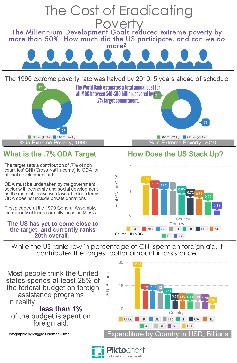Diplomacy, Development, and Furthering National Interests
Public support for diplomacy and development programs is low. Without a clearly demonstrable link between foreign aid and national interests many see supporting progress overseas as simply diverting resources from needs at home. The United States has been involved in armed conflict overseas for much of the last two decades and a war weary public is not looking to continue directing resources overseas. Challenges at home like unemployment, and the dangers of an increasingly partisan Congress coupled with popular interest in reducing government spending makes support for foreign assistance efforts politically risky.
However, there are real impacts to neglecting diplomacy and development opportunities.
While telling the story of aid has long been recognized as a challenge for State and USAID, the current political climate requires progress be made more quickly. Low Congressional support for programs directly translates to further budget cuts at a time when State is already underfunded. For the United States to be effective on the world stage, supporters of public diplomacy and development programs must clearly demonstrate the links between these efforts and national interests. Failure to do so will undermine the important progress of the 2010 QDDR and the upcoming 2014 release.
Understanding the Link
Alleviating poverty, fighting disease, and supporting education-especially for women and girls, are worthy causes but it is not always clear how addressing humanitarian concerns oversees is helpful at home.
Ensuring governments can meet the needs of their citizens, as the 2010 QDDR pointed out, is vital to American national security and combating global terror and transnational crime. Power is no longer centralized in governments and capitols. Civilian services can be and often are provided by outside groups whose interests may be counter to those of the U.S. Supporting government and civilian infrastructure for necessities like electricity, water, and education before the proliferation of dangerous cartels prevents violence, builds positive relationships and empowers individuals.
At ASP’s June 24 event with DepSec Higginbottom, Alex Thier and Rep. Tom Perriello, Thier specifically addressed the impact of the millennium development goal to reduce global poverty– defined as living on less than $1.25 USD per day, on national interests. In the most immediate sense, bettering individual’s lives results in a more positive opinion of the U.S. Additionally, participation in a market economy increases commitment to free and open exchange- a major tenant of democracy. The proliferation of shared goals can lead to shared values, and stronger diplomatic relations. Successful diplomatic relationships prevent violent conflict, enable robust economic exchanges and foster general ally-ship.
Building Public Support for Diplomacy and Development
It is no secret that communicating this link has been a challenge for State, USAID, and other supports of smart power. The 2010 QDDR began addressing this shortcoming by streamlining the administrative processes, more clearly linking missions to strategic goals, and focusing diplomatic and development efforts in key areas, but there is still a long way to go.
While a public more comfortable with long-term outcomes rather than immediate results would make support easier to come by, the State department must share the impact of programs more effectively. Drawing more attention to Foreign Service officers and their work as equal to that of members of the Armed Forces would present civilian power as equally vital to smart power as military might. State’s continued commitment to modernization and engaging with Congress, as evidenced by DepSec Higginbottom’s candor at the recent ASP QDDR event are important and welcome steps to garner stronger support.
The 2014 QDDR process and release will need to continue on this trajectory to make the necessary progress in building public support for diplomacy and development programs.
This post is one in a series on diplomacy and development ahead of the 2014 QDDR release, by ASP intern Maggie Feldman-Piltch. A longer report, examining many of the same topics more indepth is forthcoming. To submit articles, opinions, or topics for consideration please contact the author by email at mfeldmanpiltch@americansecurityproject.org or on Twitter.
Related Posts
Introduction to Foreign Aid, Diplomacy and Development Series
For Further Reading
Presidential Policy Directive on Global Development
United Nations Millennium Goals
From the American People: Why the Story that U.S Foreign Assistance is Working Must Be Told, USAID Report
“US Foreign Aid is Shrinking and Americans Don’t Care,” The Unraveler
Annual Letter, Gates Foundation
The post Diplomacy and Development Series: Telling the Story of (US) Aid appeared first on American Security Project.



